‘Hey’ is a new series where we catch up with interesting people from Plymouth and the surrounding area. We discover what they are about and what they are up to.
Next up in the series is Francesca Hawkesworth, Artist & Real Ideas.
Francesca is the Programme and Exhibitions Lead at Real Ideas, based in Royal William Yard. She’s passionate about the community, creative industry, and enabling people do to what they love in Plymouth. She’s a part of LOCI Collective which specialises in exterior and interior murals, and also creates her own artwork.
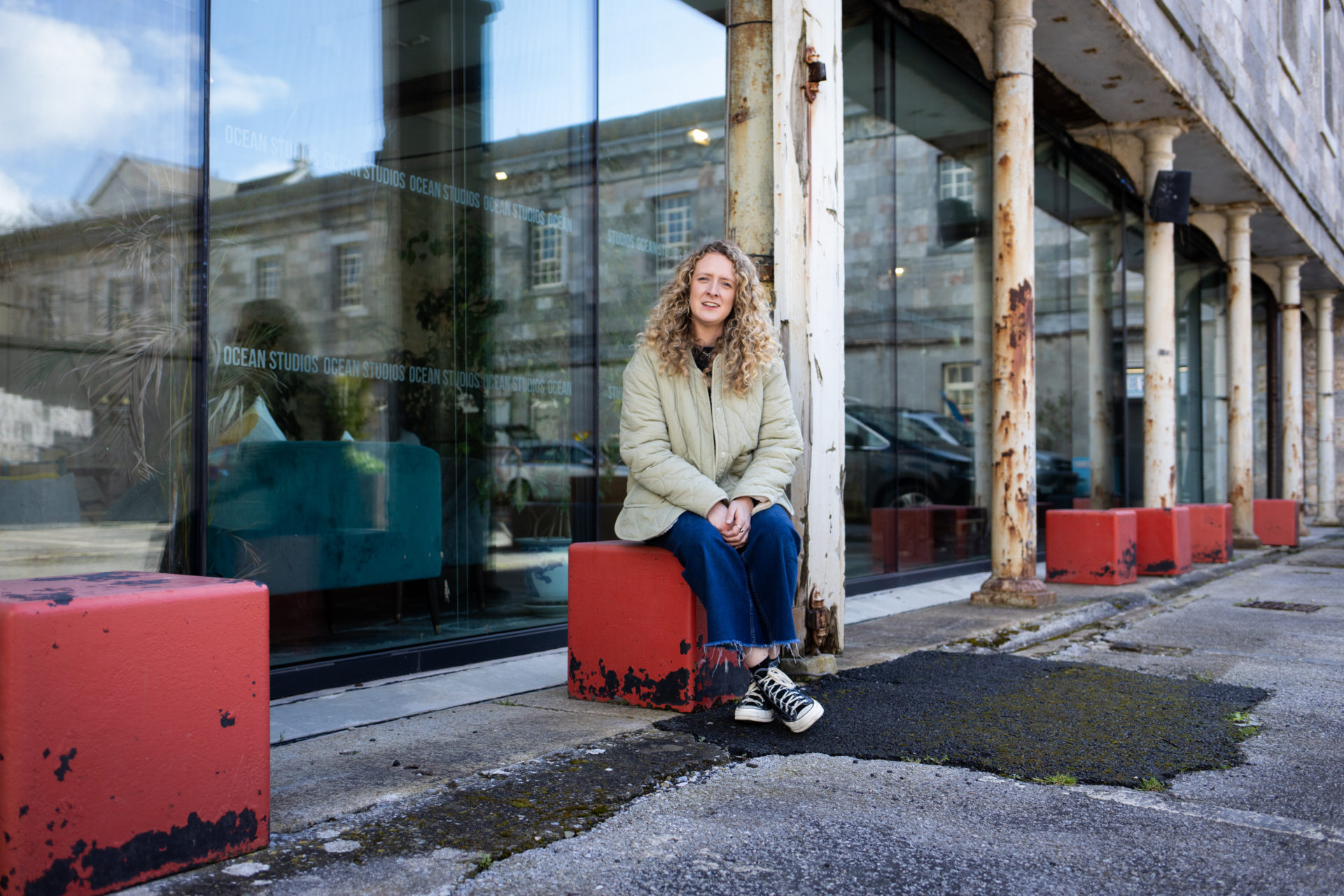
How are you?
I’m good, thank you. I’m busy. I’m enjoying that. It’s spring, which gives a fresh perspective on everything. The later evenings make me feel like I’ve got more motivation, and just the brightness, the light, everything, it makes me feel better.
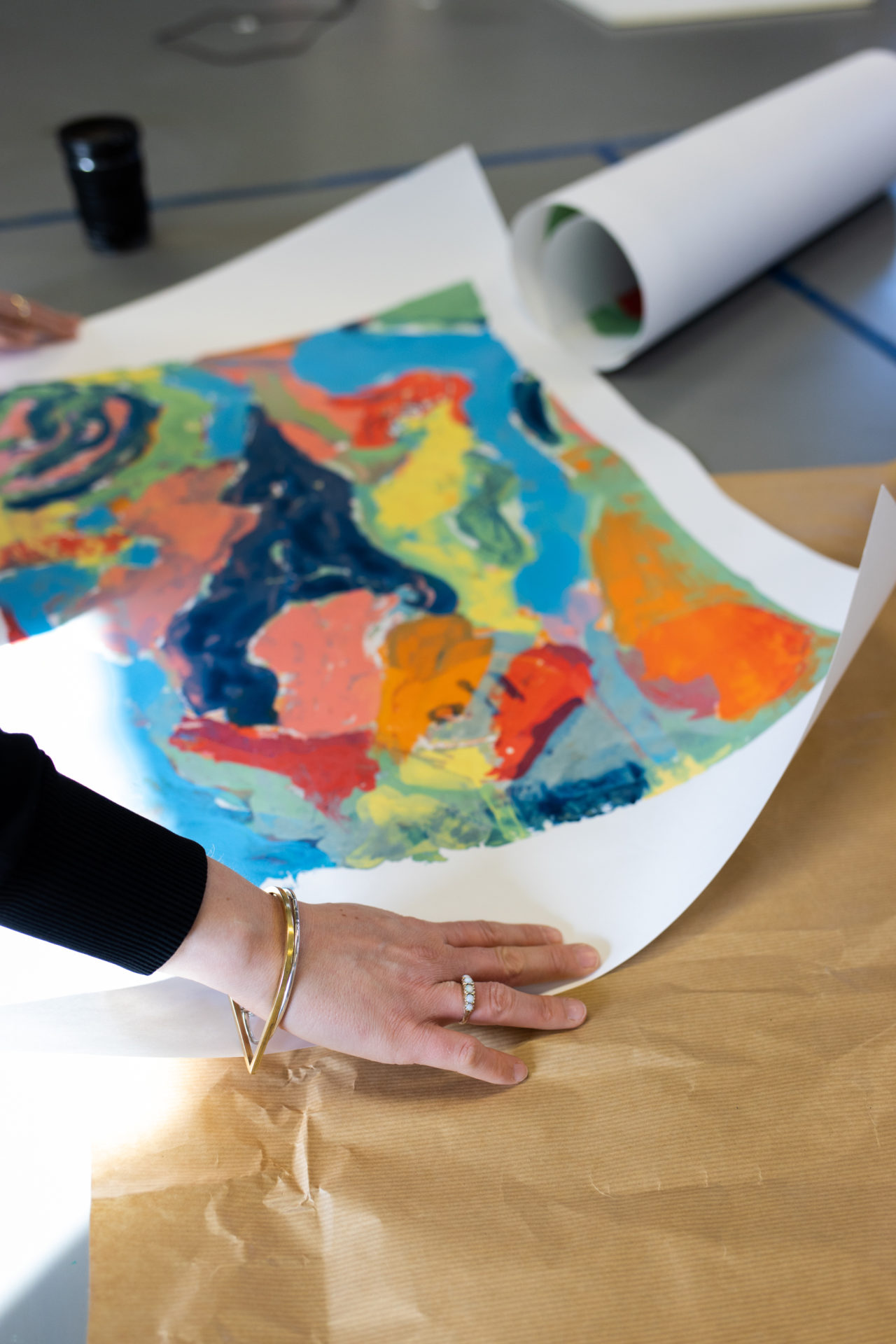
How did you start out in your creative career?
This is going to sound super cheesy, but when I was a kid, I really enjoyed doing art. My mum used to go to watercolour classes and I used to join. From then I just wanted to do art all the time. I did foundation at the Arts Uni, or PCAD back then, and then went to Birmingham, studied Fine Art and just continued through that. I’m really interested in landscape, but even more so in architecture. For me, being brought up in Plymouth and being around all the brutalist architecture, you either love it or hate it, but actually I love it. It signifies a time in history for Plymouth. And there’s flaws, but I’m trying to see the beauty within it, so I’m really interested in the angles or that kind of thing.
I’m by no way a historian or know all the facts about Plymouth City Centre, so don’t come for me, but there’s just something about how the light hits buildings in a certain way, like the shape, the form, the structure. And that’s really interesting for me. I think that resonates within my practice, whether it’s the shapes that I build or collages, that kind of thing. I feel very much influenced by Plymouth, my surroundings, but then taking that on to a fine art practise.

Is there a particular building in Plymouth that inspires you?
I like the Council House next to the Civic Centre. It’s really cool. I do also like the Civic Centre.
I went into the Civic with my grandparents when I was a kid, because we had to go in to drop something off, like a letter or something. I remember there were big revolving doors when you went in. And I have a vision of what I think it is, but whether that’s my vision or whether it’s just because I remember I’ve seen some of Dom Moore’s photos when he went in. I love that whole kind of mid-century kind of vibe.
I think the architecture element was there when I was really interested in doing murals as well, and more site-specific stuff. It isn’t just like you’re painting on a canvas, it’s something that does something for community as well. It brightens up people’s day again, that sounds cheesy, but it actually makes a difference. Some of the mural work that I’ve done before as part of LOCI Collective, we’ve had community consultations to see what people want, and quite often they’ve drawn bits that are part of the final design as well, so we’ve tried to keep it quite abstract, but it feels they’re more collaborative and like it’s actually something for them, rather than just somebody saying, oh, I want a picture of a lighthouse. We know that there’s a lighthouse in Plymouth. We all know that. But actually, what else is there? We’re more than a lighthouse.
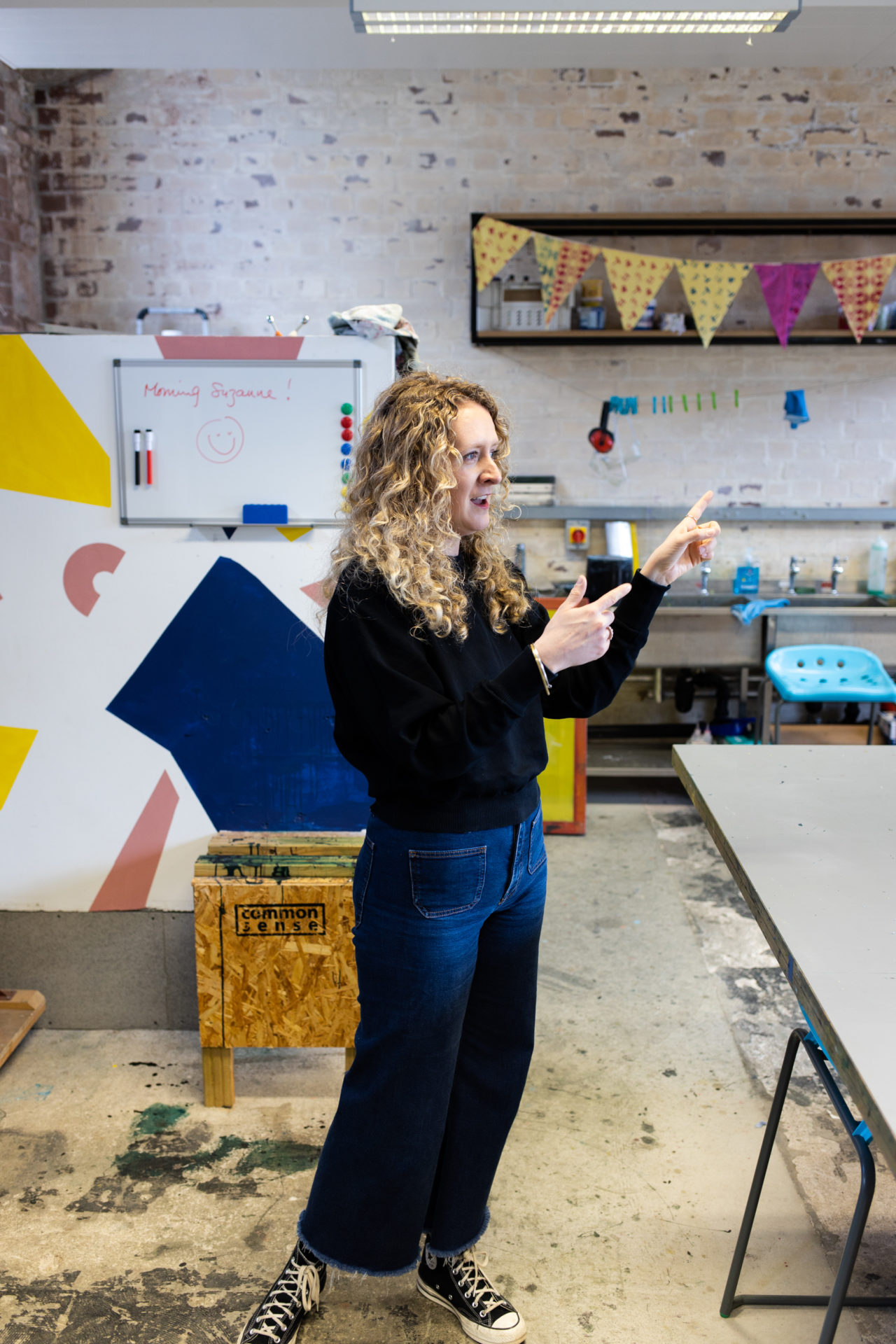
How did you get involved with Ocean Studios and Real Ideas?
I’ve been with Real Ideas for nearly seven years. I was with Ocean Studios before Real Ideas took on the building. I was involved with Real Ideas, and I’ve been in various different roles, such as Events Co-ordinator, Programme Co-ordinator, but now I am Programme and Exhibitions Lead. I look after programmes and exhibitions and basically try to activate all our spaces, making them sustainable, but also making sure that we’re collaborating and building networks, working with different artists, animating our spaces, highlighting our special facilities at print, ceramics, all of that. It’s been a journey with Real Ideas, but it’s been really exciting to kind of see how it develops.
I’ve worked at Devonport Guildhall, the Market Hall and Ocean Studios, but I’m now based at Ocean Studios again. It’s quite nice that we have been able to dip in and out of different venues. And quite often I have meetings up there. We’re really interested in how actually all of the venues talk to one another. So how could the creative practise at Ocean Studios linked to the Market Hall? Perhaps we could get some Immersive prints on the dome, that kind of thing, and vice versa. How can we get some more Immersive stuff here? We’ve got five different business units within Real Ideas, so we’re a Real Art Maker. Market Hall is Real Immersive. We’ve got a Nature and Neighbourhoods Section, Pathways and Badge Nation, but within all of those teams, we all try and interlink in interesting ways.
Devonport Guildhall is part of Real Ideas. It’s kind of managed by our Nature and Neighbourhoods Team, We’ve got members that go in and use it for dedicated space and use it as office space. And The Hedgerow Hound are currently based in the kitchen there, and Heyl Bakery started out there.
The Guild Hall also gets used for theatre rehearsals and stuff like that. The Nature Neighbourhoods Team are thinking about how we can bring a little bit more of the public facing side back to it, which is really exciting.
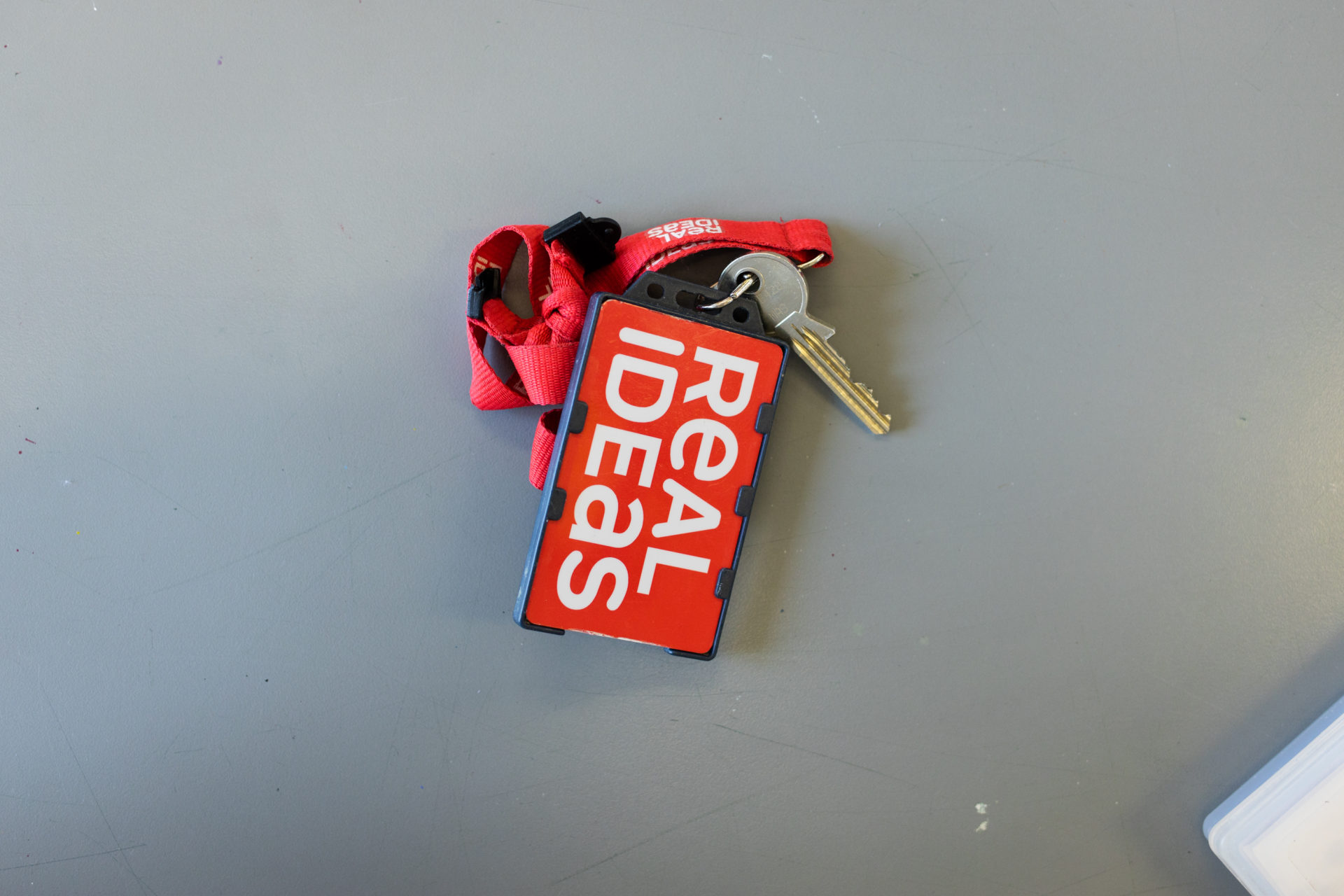
What’s your favourite thing about your job?
My favourite part of my job is being able to have a space where stuff can actually happen, like, meaningfully and from start to finish, being able to be with somebody to talk about their idea, but then make it a thing.
The Plymouth Comic and Zine Fair was a perfect example of that, working with Laura Hole, an illustrator, to visualise her idea, to put it in the space, but then also to be a bit of a soundboard for them. Is this going to work? How can we do it? How can we make it a thing? And then actually being able to see the event and then being able to say, yeah, we did that. All of the artists that had tables, lots of our staff here are creative as well, so then they kind of really vibed off being part of that whole atmosphere. I think there’s something really nice about all of those little links between being able to enable people to do what they really love doing, and then that is then contagious, isn’t it, between everyone that you then are with? So that, for me, is what I love about my job and let’s have more of that.
We do that a lot as a city. But for me, working at Ocean Studios, if we could do more of that, more often and be a platform for that, that’s really exciting. But also, I guess it doesn’t have to sit just in Ocean Studios as a team. What else could we do elsewhere to do that as well? Joining the dots a bit, but I’m also really interested in how we can put Plymouth on the map. We’ve all got a part to play, haven’t we, in trying to elevate Plymouth and wave the flag for it being an amazing place, but it’s getting people to understand that. I’m really interested in how we can network and be part of bigger conversations in the South West and further afield as well.
If you’re here, you can be part of grassroots activity. It’s not oversaturated, so you can kind of nurture your idea a little bit more.
There’s also still, like, good links in with the capital or other cities. I think Lockdown has proven to us that we can all work really well online. Your location isn’t actually a hindrance anymore. If you’re working in Plymouth, you’ve got the sea, you’ve got the community, you’ve got space, you got Cornwall on your doorstep, Dartmoor, you’re so lucky. And I do think that our role as Real Ideas and being creative at Ocean Studios is how we can be supportive for graduates so that they feel that they’ve got the confidence to work in a space after Uni. If you don’t just drop off the edge of the cliff, that’s really important, and that we can provide affordable studio space or access to equipment, residency opportunities, like all of those things. If we can do that in a way that’s really visible, then hopefully people will want to stay or feel like they’ve got a place to stay until they really figure out what they want to do. Because I think you have so much knowledge, don’t you, at Uni? And then it’s surprising how quickly you forget that. I mean, I’m going to put my hand up to say that after Uni, I didn’t step into a print room for ages, I didn’t step into a studio for a good year or so.

One thing you’d recommend everyone to try?
Don’t be scared of opportunities, just go for it. Reach out and talk to people. Networking is key in lots of ways and just being social people and present and kind of listening to people and what they’re doing, because you never know who you might come across or meet.
Just listening to understand where people are at personally on a work level and then trying to kind of understand how you might work with that or fit with that as well, that’s really important, I would say. I think from moving back to Plymouth, although I am from Plymouth, it’s almost like not taking yourself too seriously either and putting yourself in awkward scenarios is a really good thing. I think when I moved back to Plymouth, I had an internship at KARST, but I didn’t really know any of the creative community at that point. It was almost like starting from scratch. But I just thought, unless I put myself in those scenarios, how am I going to know?
And you don’t want to just think, oh, I’m not going to get that opportunity because they’re this gallery or they’re this place just put yourself out there in a way. But it’s easier said than done.

Can you tell me more about LOCI Collective and how that came about?
It came about in 2017, and there was a cafe in the Yard at the time called Victuals, and Llŷr and Joe, two of the members of LOCI used to work there, I should say there’s four of us at the minute, there’s Llŷr, Joe, Manny and Me.
We’ve had different people through the years, but then people have moved away. We’re artists, we’re painters predominantly, although we do kind of mix into different mixed media practises as well. So going back to Royal William Yard coffee, cafes, meeting people, we had an opportunity to create a mural in Royal William Yard.
We met somebody called Jody Patterson and she was a lecturer at the Uni. And part of her practice is looking at the history of murals, in America, New York, Chicago, loads of different places. She just looked at the big wall in the car park by Ocean Studios and was like, there needs to be something there. So she knew that we were artists. I worked at Ocean Studios at the time and we were like, right, let’s just do something. We had to do something themed around the Mayflower, as lots of things were on the lead up to 2020. We wanted to do something that kind of nodded to seafaring, but from mythical creatures and that kind of aspect. We kind of came together through that. We’d never painted a mural before. Like, who knew how we were going to put our design onto that wall? But then from that we did it and that was really great. But we had a series of opportunities after it to work with different communities in Plymouth. So that’s when things started to get really interesting, because actually, we could meet different groups of people, we could talk through ideas with people that lived in that community.
Some people would say, oh, we just want something vibrant. Some people would want something that felt quite literal, and some people wanted flowers. We had consultations to pull ideas together and to put together abstract, kind of contemporary, almost large scale paintings that would sit within communities, things that were accessible, but also just to kind of bring positive vibes to the space. We had a series of different murals in Stone House. We’ve had another couple in Royal William Yard that have been on the boardings here. We’ve done the Hoardings at Civic Centre, we’ve done stuff in schools, work with different communities, Prime skate park. We’ve done murals all around, but we’ve just tried to always make them really bright, really vibrant and something a bit different. Plymouth, there are lots of really kind of abstract and contemporary murals in lots of cities and we felt that Plymouth was kind of missing that there are a lot more murals now, which is really great.
The council has actually been really supportive for us to do that. At first, you kind of test the water with it, but I think now there’s an understanding that actually murals do bring value to the community. So that’s LOCI in a broad nutshell.
It’s quite challenging, actually, when somebody is saying we want something in a brief that looks like this and need it by this time, and this is what we want the outcome to be. So you’ve got to then tailor your practice, but then quite often we work on things collaboratively. There have been some instances where all four of us have kind of added elements to the design. There have been some elements where it’s just one of us, sometimes it’s two people. Then you’ve got real mixes of practises as well. Joe and I both come from quite abstract practices, but with very different approaches. Manny is more illustrative and has more of a graphic design element as well. But, yeah, there’s challenges within that as well, but it’s quite an exciting challenge because then you kind of working collaboratively can be exciting, kind of testing, but then also, at the end of it, you’ve created something that feels like it was for everyone, rather than just one artist. Ego is probably the wrong word, but like, one artist’s vision. I feel like it’s a bit unique in that sense.
I think sometimes what we would all probably love is for somebody to say, we’ve got this wall, do you want to just paint your own thing on it? That would be amazing. That would be really great. But equally, we understand that we’re doing stuff for the community and it isn’t just all about our practice as well. But sometimes it would be really nice to have opportunities to just put your own practice on the wall, if I’m being really brutally honest.
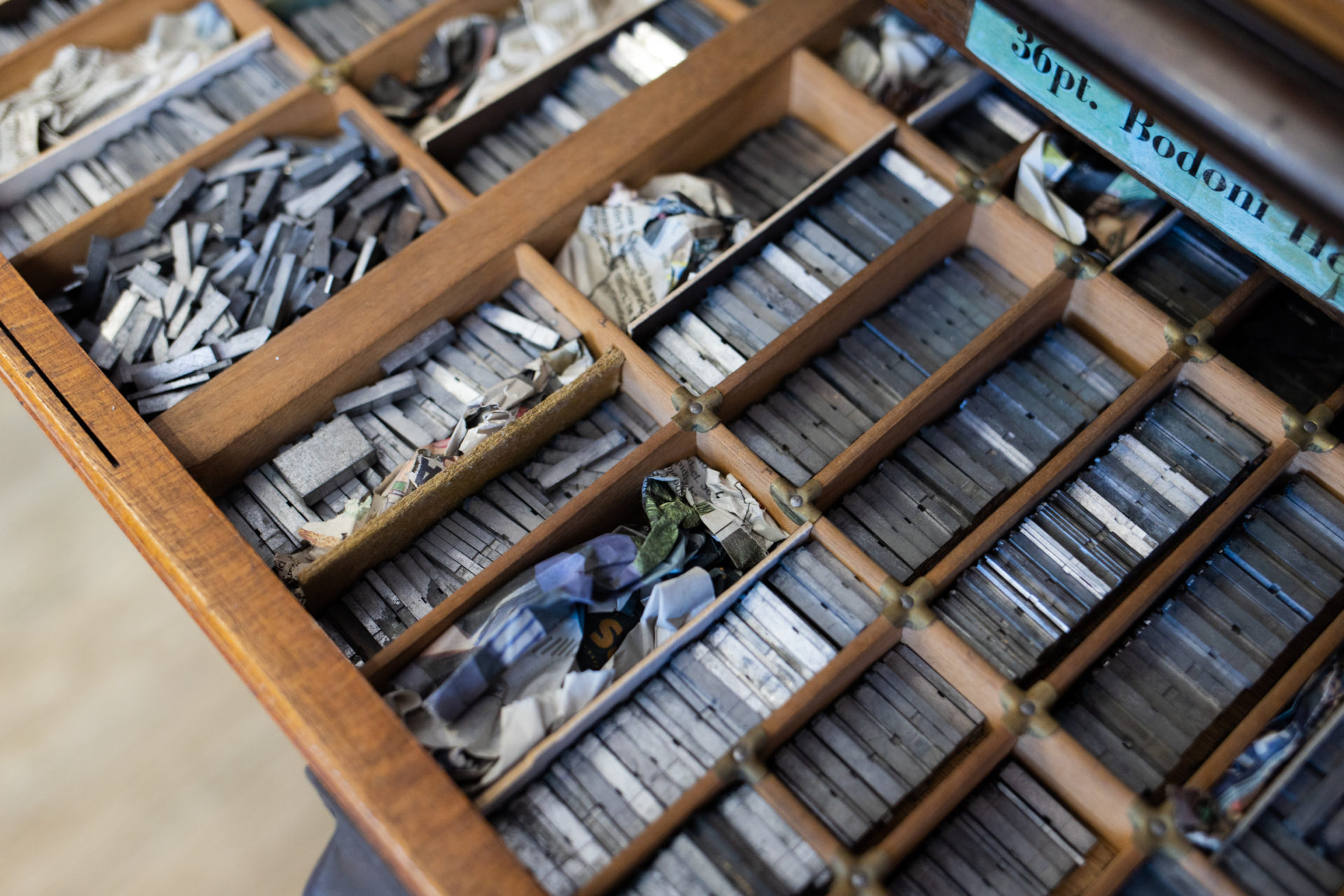
How do you maintain a work life balance?
Oh, that’s really tough, actually. I‘m pretty absorbed in everything creatively, so sometimes it is really hard to get a balance between work and life and like, work and my own practice, and I think it goes back to listening and being active. My own practice kind of lives on through my daily work and then I think how I balance that with life is then kind of surrounding myself with creative people. If I’m going for a walk or I’m catching up with people, more often than not it tends to be people that might be artists or have a creative field. And that’s not specifically just the type of people I want to hang out with. Don’t get me wrong, like my friendship group sprawls across a variety of different people, but it’s just getting a balance between being creative as a whole, but then also making sure that there is downtime.
It’s really hard to get a work life balance and I think it’s not always saying yes all the time as well. Like knowing when to say no.
But also understanding who your core kind of community is. If you are doing stuff, you can still kind of be creative as well and they’re not feeling like a chore. So it’s a balance between knowing who your people are, and people that you can call on, but taking some time to be in nature. Say no to things, enjoying the place that you live in and being present with it as well, not taking it for granted.

Playlist or podcast?
It depends on the setting. Podcast wise, this actually kind of links to your last question. Everyone else has probably listened to it already, but I’ve actually started listening to Fern Cotton’s Happy Series because I feel like sometimes it’s really good to listen to people that are also going through perhaps troubling times or challenging instances within their life. And I’ve been listening to that recently and I actually feel like it’s been really helping. It’s like trying to see the positives within busy scenarios or challenging scenarios within your life. So whether that’s loss or grief, whatever at the minute, I would recommend it.
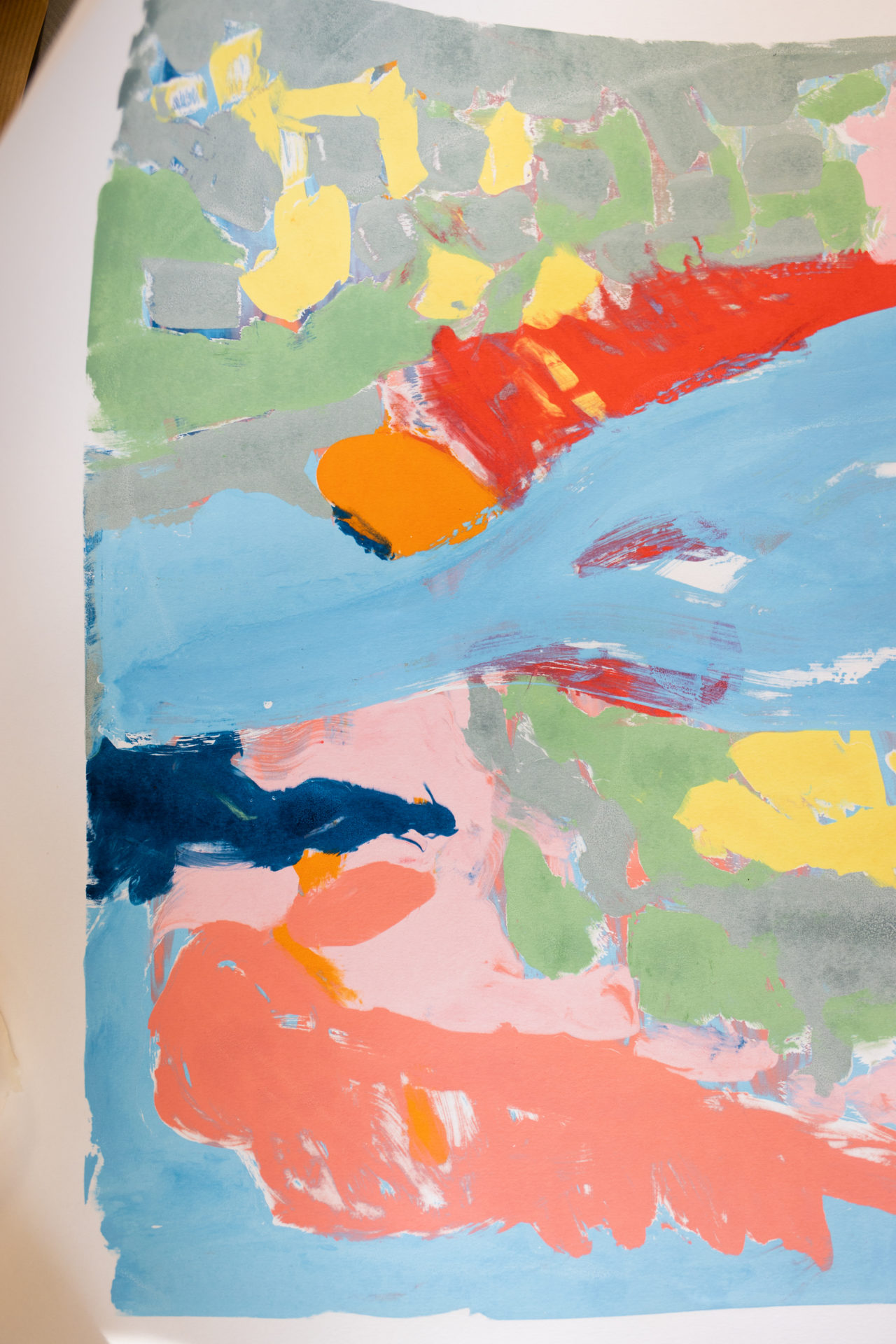
Any advice for up and coming artists, print makers and creatives?
Try not to fall off the Uni cliff and try to understand what resources are available for you in your city. Don’t necessarily see cost as a block for that, because actually, there are schemes like residencies or other programmes that might be able to support you into continuing your practise. More often than not, there are people that are willing to support or listen if you want to continue something. But also, I’m sure I’m speaking for other organisations in the city as well, just kind of understand the network that you could call on afterwards. It’s kind of understanding that just before you leave, or even from the beginning of your Uni experience, if you haven’t left it that long, but knowing where you can filter into so you’re not feeling like you’ve just left would be the thing that I’d say.

What keeps you in Plymouth?
Oh, that’s a good one. I think it’s the opportunities that are here, you can make things happen. But then on a kind of life level as well as there’s the Sea, Dartmoor, Cornwall, and the cost of living here, it’s really attractive. It’s good. I don’t see myself wanting to leave anytime soon because there are enough things that the quality of life is just very smart.
I think that with here, you’re only like, maybe two people away from being able to get what you would need, you know what I mean? And it’s probably the same everywhere you go, but I feel like in Plymouth particularly, everyone kind of knows everyone a little bit, and if you don’t, all you need to do is kind of ask.
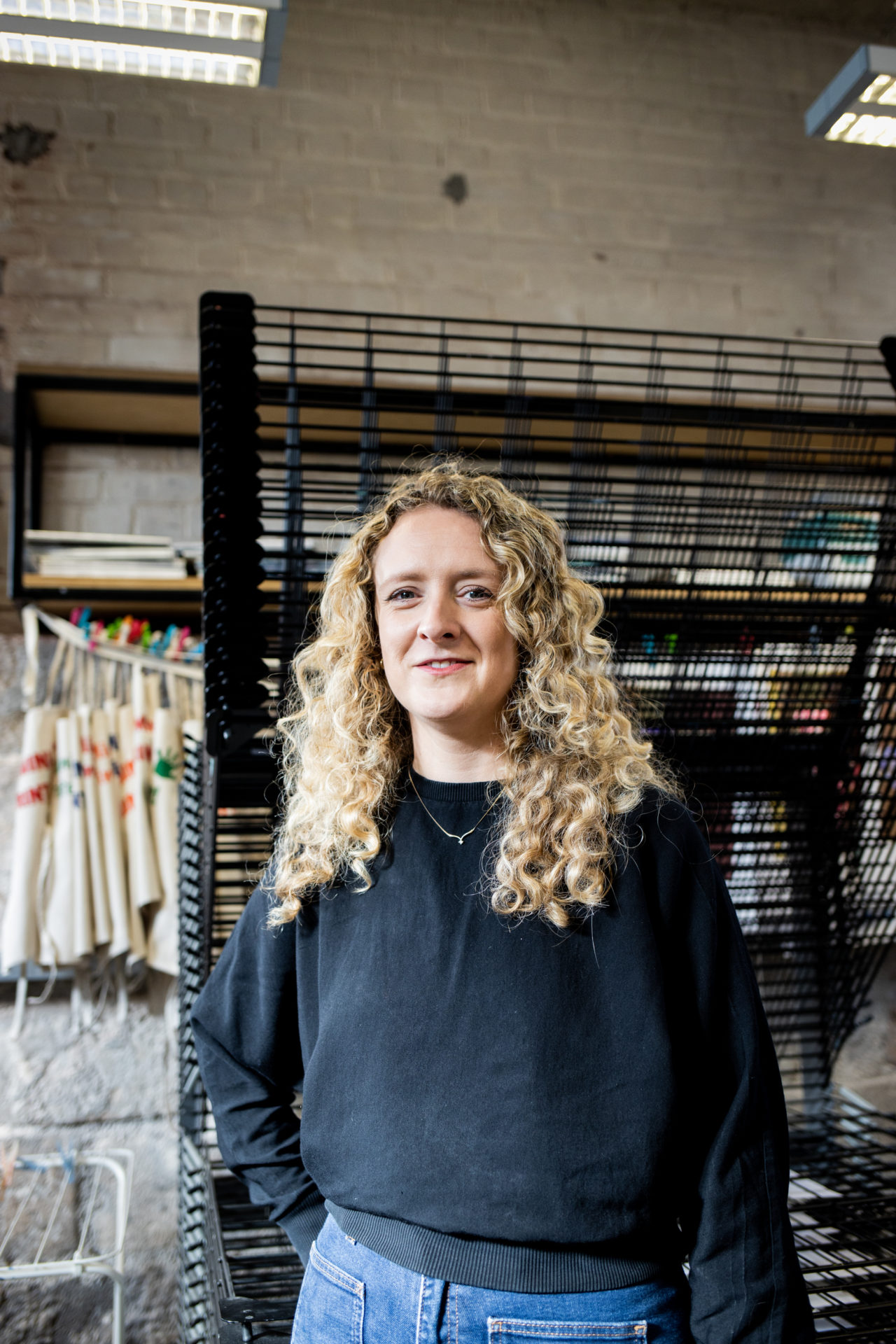
Check out Francescas’s work:
Instagram > https://www.instagram.com/francescahawkesworth/
—
If you’d like to feature on our HEY Series please let us know. Get in touch here.